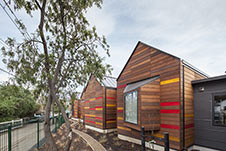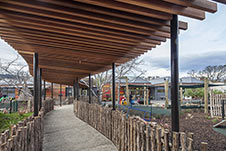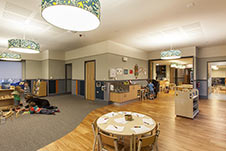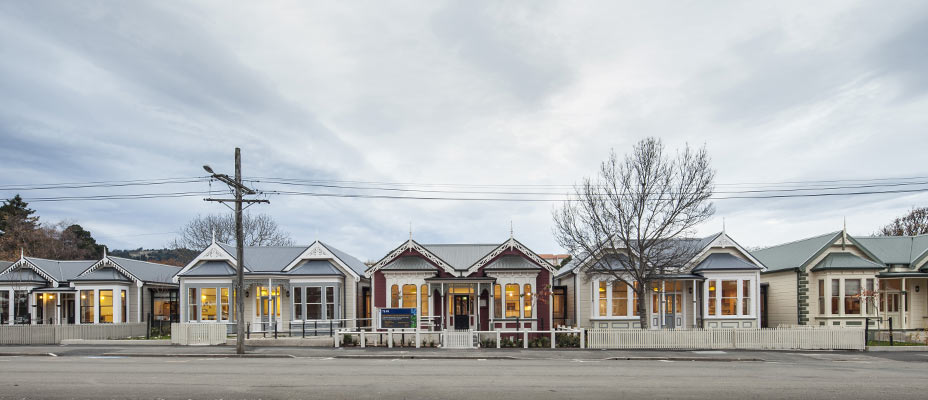
UniNews
Te Pā opens
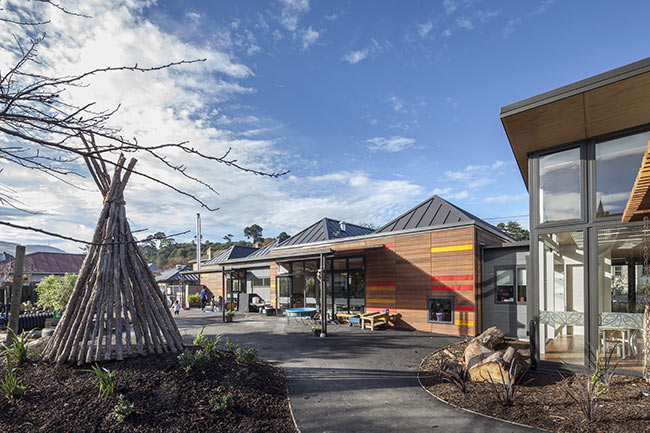
The Otago University Childcare Association's new facility, Te Pā, has been officially opened, providing high-quality childcare and learning amenities in a safe, comfortable and aesthetically pleasing environment.
Eleven separate buildings were demolished on the on-campus site between Castle Street and Montgomery Avenue to make way for the new centre. However, the original look and feel of the Castle Street frontage has been retained with the recycling of bay windows, fascias and other decorative features from the former Edwardian villas. And, on the Montgomery Avenue side of the complex, project architects Parker and Warburton Team Architects have designed a modern interpretation of the classic villa.
The new facility effectively provides four childcare centres in the one location:
- Te Pārekereke o Te Kī: a bilingual centre for up to 28 children aged up to five years
- Te Maioha: two rooms of up to 16 children under two years of age
- Te Puna and Te Uru: each catering for two groups of 20 children aged from two to three and a half, and three and a half to five years of age.
Cementing the future
Building developments totalling around $650 million over the next 15 years will further cement the University of Otago's position as a leading teaching, learning and research institution.
The University's Priority Development Plan was approved in principle by Council in June and follows the guiding principles of, and many of the projects signalled in, the 2010 Campus Master Plan.
At the top of the list is a new Dental School, recognising the importance of Otago's school as the only tertiary training facility for dentists in New Zealand. Also given high priority are a major renovation of the Science precinct and upgrading of research project facilities mainly for Health Sciences in Dunedin.
Other projects on the list include:
- the construction of teaching, learning and research space at the Portobello aquarium with a longer-term goal of a new marine science teaching facility and aquarium, preferably in the Harbour Basin area
- new arts and biomedical research buildings
- new music facility (incorporating a new Centre of Performing Arts) and new facilities for the Department of Botany
- new research facility in the Christchurch Health Precinct for the University of Otago, Christchurch
- redevelopment of the former Unipol building, and a new student and academic services hub
- improvements to access and safety of the Commerce Building and refurbishment of buildings in the University's historic precinct
- completion of the refurbishment at the University of Otago, Wellington
- continuation of seismic strengthening work.
Vice-Chancellor Professor Harlene Hayne says the Priority Development Plan shows what the University intends to focus on in the medium term with regards to its built environments.
“We want to improve what is already a first-class experience for students, teachers and researchers, and we want the campus to be enjoyed by the communities in which we live.”
However, she also points out that it is a living document and other projects may be added, or removed, as situations and needs change.
Supreme teaching award
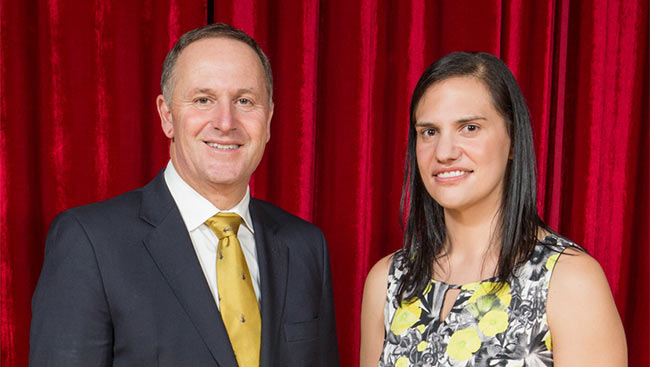
Prime Minister the Rt Hon John Key with Dr Karyn Paringatai.
For the third successive year, an Otago academic has won New Zealand's top prize for tertiary teaching. The Prime Minister, the Rt Hon John Key, presented his 2014 Supreme Award for Tertiary Teaching Excellence to Dr Karyn Paringatai (Ngāti Porou), lecturer at Te Tumu – School of Māori, Pacific and Indigenous Studies.
The Supreme Award recognises Paringatai's 12 years of teaching learners from a wide variety of backgrounds to become a “whānau of champions” for the revitalisation of te reo Māori.
Her award citation noted that:
“as a committed practitioner of Kaupapa Māori and a passionate student and scholar of te reo Māori and Māori performing arts, Karyn Paringatai personifies excellent teaching. Her revival of the ancient practice of teaching in the dark and subsequent research into its benefits is world leading and has the potential to positively impact teaching in a range of disciplines, including law. She is an exceptional teacher whose teaching excellence transcends her particular discipline and the boundaries of ethnicity.”
Paringatai is the third Otago staff member to have won the supreme award over the past three years. Last year it was awarded to Associate Professor Gordon Sanderson from the Dunedin School of Medicine and, in 2012, to Associate Professor Rhiannon Braund of the School of Pharmacy.
A total of five Otago academics have won the Prime Minister's Supreme Award for Tertiary Teaching Excellence in the past 12 years, a level of success unmatched by any other tertiary institution.
Confucius Institute launched
The Otago satellite office of the Confucius Institute in Auckland was recently formally launched in Dunedin.The institute is dedicated to enhancing understanding between China and New Zealand.
The launch also marked the development of a Memorandum of Understanding that will see the University work with the Confucius Institute at the University of Canterbury to facilitate the promotion of Chinese language and culture in schools and the community of Dunedin.
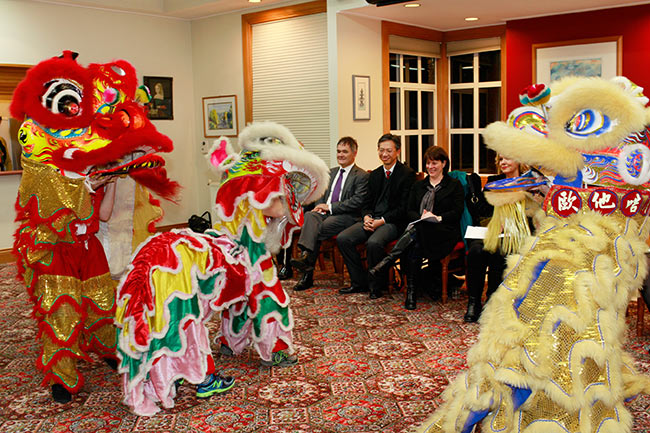
Arts fellows selected
The University's support of New Zealand's multifaceted arts community continues with the selection of its 2015 Arts Fellowships.
Wellington poet Louise Wallace has been named Robert Burns Fellow; Auckland artist John Ward Knox as Frances Hodgkins Fellow; Hamilton-based composer Jeremy Mayall continues as Mozart Fellow; US-based dance therapist Uzoamaka Nwankpa as Caroline Plummer Fellow in Community Dance; and Robyn Belton and Jennifer Beck will be the University of Otago College of Education Creative NZ Children's Writers in Residence.
Otago partner in National Science Challenges
The University is a partner in all four National Science Challenges for which funding has been announced so far.
The four challenges involve:
- developing high-value foods with health benefits
- understanding the role of the Antarctic and Southern Ocean in determining climate and future environment
- protecting and managing New Zealand's biodiversity, improving its biosecurity and enhancing our resilience to harmful organisms
- enhancing the use of New Zealand's marine resources within environmental and biological constraints.
These are among 10 challenges selected last year to tackle the biggest science-based issues and opportunities facing New Zealand. They provide an opportunity to align and focus the country's research on large and complex issues by drawing researchers together from different institutions and across disciplines to achieve a common goal through collaboration.
Science investment funds
Six innovative University of Otago-led research proposals will receive $10.15 million in new science investment funding. The new programmes are being supported through the health and society, high-value manufacturing and services, and biological industries funds administered by the Ministry of Business, Innovation and Employment.
The programmes involve developing:
- a mathematical model for New Zealand policy-makers to assesses the benefits, cost and cost-effectiveness of a range of health interventions
- improved titanium implants to reduce complications and implant failure
- protein from lower grade wool as a premium food ingredient
- medical technology allowing neurochemicals to be non-invasively delivered to the brain to treat diseases such as Parkinson's
- highly accurate portable gravity-measuring devices using atomic optics for geo-science and other field applications
- compounds for infant formula that stimulate the growth of healthy bowel bacteria in a similar way to breast milk.
Deputy Vice-Chancellor (Research and Enterprise) Professor Richard Blaikie says these proposals exemplify the innovative, world-leading research undertaken at Otago.
Health research supported
Otago researchers gained more than $31 million to support their innovative studies in this year's Health Research Council annual funding round.
The researchers were awarded 24 contracts, including three multi-million, five-year programmes, 14 projects and seven grants for emerging researchers. Otago's successful applicants spanned the University's campuses in Dunedin, Christchurch and Wellington and, together, gained the largest share of funding of any institution in this latest round.
Otago debaters excel
The Otago University Debating Society (OUDS) has continued its run of successes by recently taking top honours in New Zealand's oldest and most respected national university debating tournament, Joynt Scroll.
Earlier this year, OUDS was named in the top tier of competitors for the World Universities Debating Championship 2015 team allocations, alongside 10 other prestigious institutions including Oxford, Yale, Harvard and Cambridge.
The ranking reflects OUDS's performances at the past three championships, in which it defeated universities such as Harvard, Yale, Oxford, Cambridge, London Union and Princeton. Most notably, Otago reached the 2013 grand final – the first time in OUDS's 125-year history that an Otago team has done this.
The 2015 world championships will be held in Malaysia in late December and early January with around 400 teams competing.
Appointments
Professor Paul Brunton as Dean of the University's Faculty of Dentistry. A leading UK dental researcher, Professor Brunton comes to Otago from the University of Leeds' School of Dentistry where he was Director of Student Education, providing strategic leadership to curricula development and innovation at both undergraduate and postgraduate levels.
Professor Vernon Ward as Dean of the Otago School of Medical Sciences. An internationally respected virologist, Professor Ward was formerly Head of the University's Department of Microbiology and Immunology, one of the five large research-intensive departments that comprise the school.
Christchurch paediatric surgeon Dr Kiki Maoate as the University of Otago, Christchurch's first Associate Dean, Pacific, a role established to give priority to Pacific Islands issues in the University's teaching, research and links with community. Dr Maoate will also continue his paediatric surgery work.
Professor Nancy Longnecker to a Chair in Science Communication. An internationally regarded science communicator, Professor Longnecker joins Otago from the University of Western Australia, where she developed and led its science communication teaching and research programme between 2002 and 2014.
Professor Tim Stokes to the Elaine Gurr Chair in General Practice at the Dunedin School of Medicine. A leading UK academic general practitioner, Professor Stokes was formerly a senior clinical lecturer in Primary Care at the University of Birmingham. He has also undertaken more than a decade of work with the UK's National Institute for Health and Care Excellence.
Achievements
Associate Professor Keith Probert (Marine Science) received New Zealand's top award for marine science in recognition of his outstanding contribution to the field. A Lifetime Achievement Award was presented to this nationally and internationally respected benthic ecologist at the New Zealand Marine Science Society's annual conference.
Professor Parry Guilford (Biochemistry) won the Health Research Council's Beaven Medal, which recognises excellence in translating research into clinical practice. Professor Guilford's ground-breaking research into stomach cancer has saved many lives worldwide. He has also played a key role in developing a simple urine bladder cancer test that is now on the market.
Associate Professor Lisette Burrows (Physical Education, Sport and Exercise Sciences) received Physical Education New Zealand's Sir Alexander Gillies Medal in recognition of her research into the place and meaning of health and physical culture in young people's lives. She is only the 10th person to be awarded the medal since its inception in 1967.
Professor Colin Townsend (Zoology) received the 2014 Award of Excellence of the Society for Freshwater Science, which is the leading international body with a focus on stream ecology. The award recognises his extensive research contributions exploring how flow-related disturbance, invasive species and multiple agriculture stressors affect stream ecosystems.
Professor Glenn Summerhayes (Anthropology and Archaeology) was officially made an Officer of the Order of Logohu by the Papua New Guinea Governor-General in recognition of his decades-long contributions to the archaeology of that country.
Associate Professor Peter Dearden (Biochemistry) was awarded Genetics Society of AustralAsia [sic] Ross Crozier Medal for outstanding contributions to genetics. The medal recognises his work on evolution and development, epigenetics and developmental plasticity.
Professor Greg Cook (Microbiology and Immunology) is this year's recipient of the University's highest distinction, the Distinguished Research Medal. Professor Cook is a world-leading authority on how bacteria grow and survive in extreme conditions and has gained an international reputation for his innovative studies into bacterial physiology.
Dr Rob Middag (Chemistry) received a 2014 Heineken Young Scientists Award from the Royal Netherlands Academy of Arts and Sciences in recognition of his contributions to oceanic trace elements research.
Associate Professor Haxby Abbott (Surgical Sciences) and Dr Peter Fineran (Microbiology and Immunology) are co-recipients of the University's Carl Smith Medal and Rowheath Trust Award. The medal and award recognise outstanding research performance of early career staff at the University.
Dr Anita Dunbier (Biochemistry), Dr Khaled Greish (Pharmacology and Toxicology), Dr Jason Gurney (Public Health, Wellington), Dr Anna Pilbrow (Medicine, Christchurch) and Dr Zach Weber (Philosophy) are the latest recipients of the University's Early Career Awards for Distinction in Research.
Professor Murray Thomson (Oral Sciences) received the 2014 International Association for Dental Research (IADR) Distinguished Scientist Award in Geriatric Oral Research. Professor Thomson is the only New Zealander to have won two prestigious awards from the IADR. In 2010, he received its H. Trendley Dean Distinguished Scientist Award in Epidemiology and Public Health.
Dr Angela Wanhalla (History and Art History) received Australasia's most prestigious history award, the Ernest Scott Prize, for her book exploring the history of inter-racial relationships in New Zealand, Matters of the Heart.
Emeritus Professors
The University Council has this year awarded the following academics the status of Emeritus Professor: Professor Jean Fleming (Anatomy), Professor David Green (Anatomy), Professor TomKardos (Oral Sciences), Professor Alan Musgrave (Philosophy), Professor John Smillie (Law) and Professor Colin Townsend (Zoology).
Obituary
Professor Jules Kieser (1950–2014). Professor Kieser joined Otago as Chair and Head of Department in Oral Sciences in the Dental School in 1996. He is remembered as a dynamic academic who made outstanding contributions to teaching and research at the University, and to forensic services in New Zealand and abroad.

